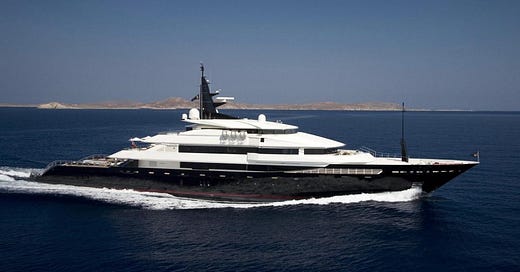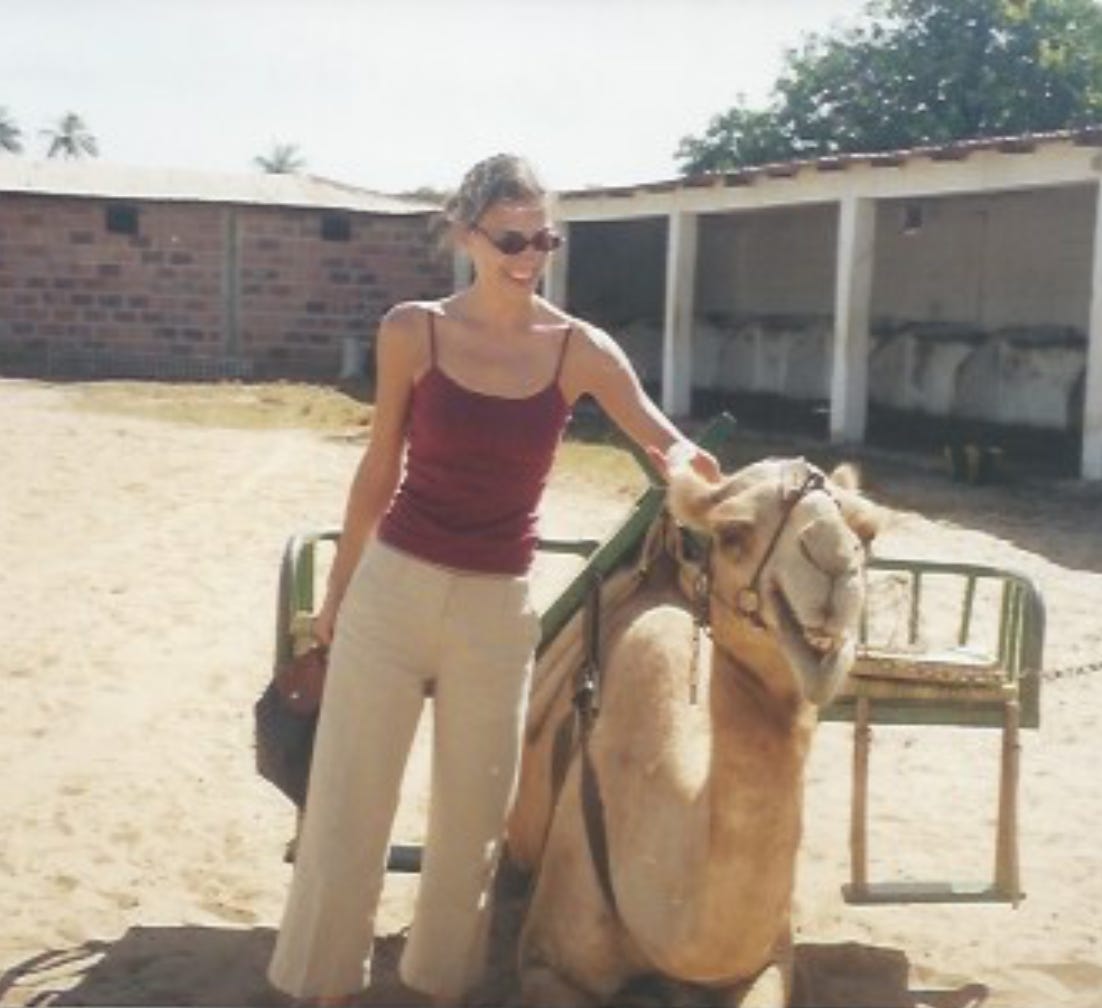Alfa Nero and the Billionaires Who Own Nothing
A #YachtWatch drama unfolds in Antigua and Barbuda
A friendly reminder that Rant! is a reader-supported publication. Please sign up and share! You get a weekly newsletter and paid subscribers get access to my Foreign Influence Operations course and other additional content. I hope you’ll consider subscribing.
ALEX’S WEEKLY RANT
Most people wouldn’t consider buying the seized mega yacht of a pissed off Russian oligarch. There’s the price, of course, in the multimillions, compounded by enormous operational and maintenance costs. Then there’s the whole pissed off Russian oligarch part.
But Eric Schmidt isn’t most people. The former Google CEO jumped at the chance to buy the sanctioned Russian yacht Alfa Nero, which the government of Antigua and Barbuda auctioned off after determining the yacht had been abandoned by its owner. The US government believes the 267-foot yacht is owned by Andrey Guryev, a Russian fertilizer magnate worth $9.7 billion (both the yacht and Guryev are under sanctions). But Guryev has insisted he isn’t the owner, although he has admitted to using the yacht from time to time.
The Antiguan government was eager to get the vessel off its hands and out of its marina, where it had been racking up bills of about $112,000 a month, and it finally got permission from the US Treasury (which had asked for the yacht to be seized) to auction it off. The Antiguan government received over twenty bids for the yacht. (For more background on Alfa Nero and the lead up to the auction, read this #YachtWatch update about a number of court cases involving seized Russian yachts, and this Rant! about the yacht and Guryev.)
In the end, Eric Schmidt won the auction, agreeing to purchase Alfa Nero for a reported $67.6 million.
Pissed Off Russian Oligarchs
Suddenly, the Guryev family got much more interested in the future of the yacht that the family’s patriarch, Andrey, had insisted wasn’t his. His daughter, Yulia Guryeva-Motlokhov has filed an injunction to stop the sale, claiming Alfa Nero belongs to her family. Schmidt’s lawyers have advised him to withhold payment until the court matter is resolved.
By sheer coincidence, unlike her father, Yulia is not under sanctions, marking yet another example of how opaque offshore corporate structures allow Russian oligarchs to skirt sanctions and maintain access to their assets, which are listed under the names of different family members and trusts.
In fact, the Guryev family has a quite a history of using offshore companies and trusts to hide assets, avoid sanctions, and evade taxes (allegedly).
Meet the Guryevs, Billionaires Who Don’t Own Anything
Andrey Grigoryevich Guryev is the former head of PhosAgro, a giant chemical and fertilizer company in Russia. He is married to Evgenia Guryeva. Their son, Andrey Andreyevich Guryev, is the former CEO of PhosAgro and now owns a financial services company in Russia. He is married to a woman named Valeria, who once claimed on Instagram she was “too pretty for work.” Yulia, the daughter, is married to a hedge fund manager whose daddy works at PhosAgro.
PhosAgro is not officially owned by the Guryevs. Rather, the family are beneficiaries of a trust that holds a large stake of the company through offshore companies.
Nor do the Guryevs own Witanhurst, London’s largest property after Buckingham Palace, despite the fact that the elder Guryevs resided there (presumably until the father was sanctioned). Yulia and her hedge fund husband live next door (and once upset neighbors with their plans to build an amusement park in the yard for their twin toddlers).
Witanhurt is officially owned by Boradge Ltd., a company incorporated in the British Virgin Islands. Guryev the Elder’s London lawyers told The Guardian—with a straight face—“Mr. Guryev does not own Witanhurst.” A Guryev spokesman said Guryev was the beneficiary of a trust that owns the property, but that Guryev himself was not the legal owner.
A Family that Stores Wealth Offshore Together Stays Rich Together
All of which sounds very similar to what they told the Antiguan government about Alfa Nero.
Guryev does not own PhosAgro; a trust does. Guryev does not own Witanhurst; a trust does. Guryev does not own Alfa Nero; likely, a trust does. But that’s all on paper. In reality, of course, the Guryevs are the ultimate beneficial owners.
All of this is by design. If the assets aren’t really theirs, authorities can’t take them away, nor can they hinder the family’s access to them.
This is hardly the first example we’ve seen of family members stepping in (or being used) to make sure assets aren’t seized because of sanctions. For example, Russian billionaire Alisher Usmanov insisted the yacht Dilbar (seized in Germany and named for his mother) didn’t belong to him, but rather to his sister. Sergei Chemezov claimed the yacht Valerie, seized by Spain and valued at $140 million, belongs to his daughter-in-law, a teacher making about $20,000 a year.
So, will Eric Schmidt be allowed to purchase the yacht he won at auction? Or will Yulia Guryeva manage to keep the yacht in the family? We’ll have to wait for the drama to play out in court.
In the meantime, the Alfa Nero drama highlights, yet again, the need to sanction the family members of Russian oligarchs. Like their oligarch patrons, they, too, are benefitting from a corrupt system. Even worse, they are helping corruption take root in our democratic systems.
THE WEEK’S LINKS
A roundup of stories you should be reading
RUSSIA
How Stalin’s Control of Foreign Reporters Helped Shape Russia Coverage Today (NY Times)
Mercenary boss returns to Russia to collect money and guns (Washington Post)
Alex Finley is a former officer of the CIA’s Directorate of Operations, where she served in West Africa and Europe. She writes and teaches about terrorism, disinformation / covert influence, and oligarch yachts. Her writing has appeared in Slate, Reductress, Funny or Die, POLITICO, The Center for Public Integrity, and other publications. She has spoken to the BBC, MSNBC, CNN, C-SPAN’s Washington Journal, France24, and numerous other media outlets. She was also invited once to speak at Harvard, which she now tells everyone within the first ten seconds of meeting them. She is the author of the Victor Caro series, satirical novels about the CIA. Before joining the CIA, Alex was a journalist, covering Capitol Hill, the Pentagon, and the Department of Energy. She reported on issues related to national security, intelligence, and homeland security. Did she mention she was invited to speak at Harvard?








Russians would not be able to exploit these loop holes if there was a serious effort to close them. The invasion of Ukraine and the subsequent sanctions of Russia/Oligarchs has made these loopholes more visible, however, is there any discussion by Western elected officials to close them? They exist because the wealthy have been able to successfully leverage their wealth to influence the courts and the law. The Panama papers resulted in an initial flurry of outrage after exposing how the global wealthy legally exploit “the law.” However, in a matter of weeks, lawyers again used “the law” to stonewall any further investigations into their clients well insulated lives. The beat goes on.